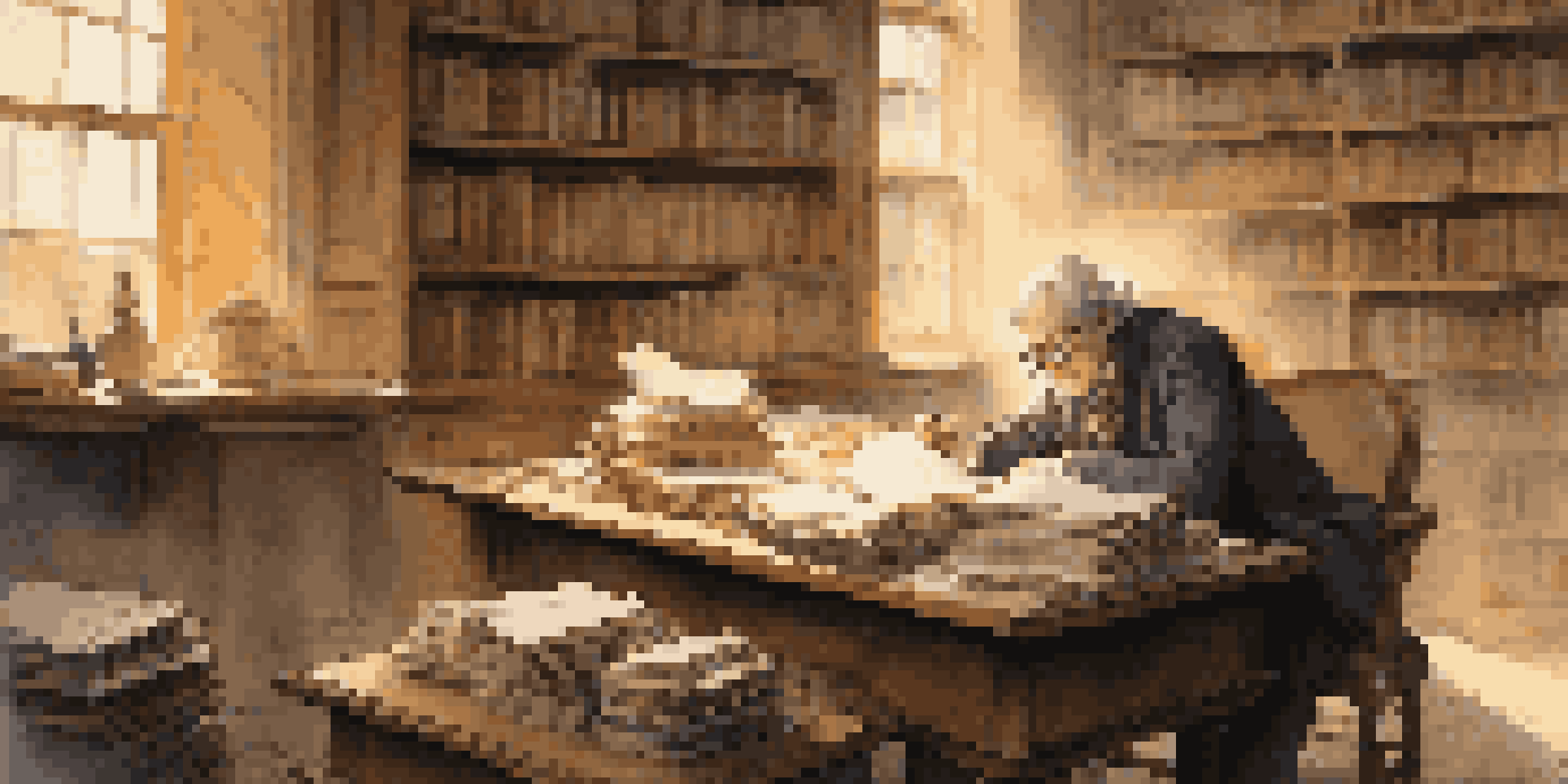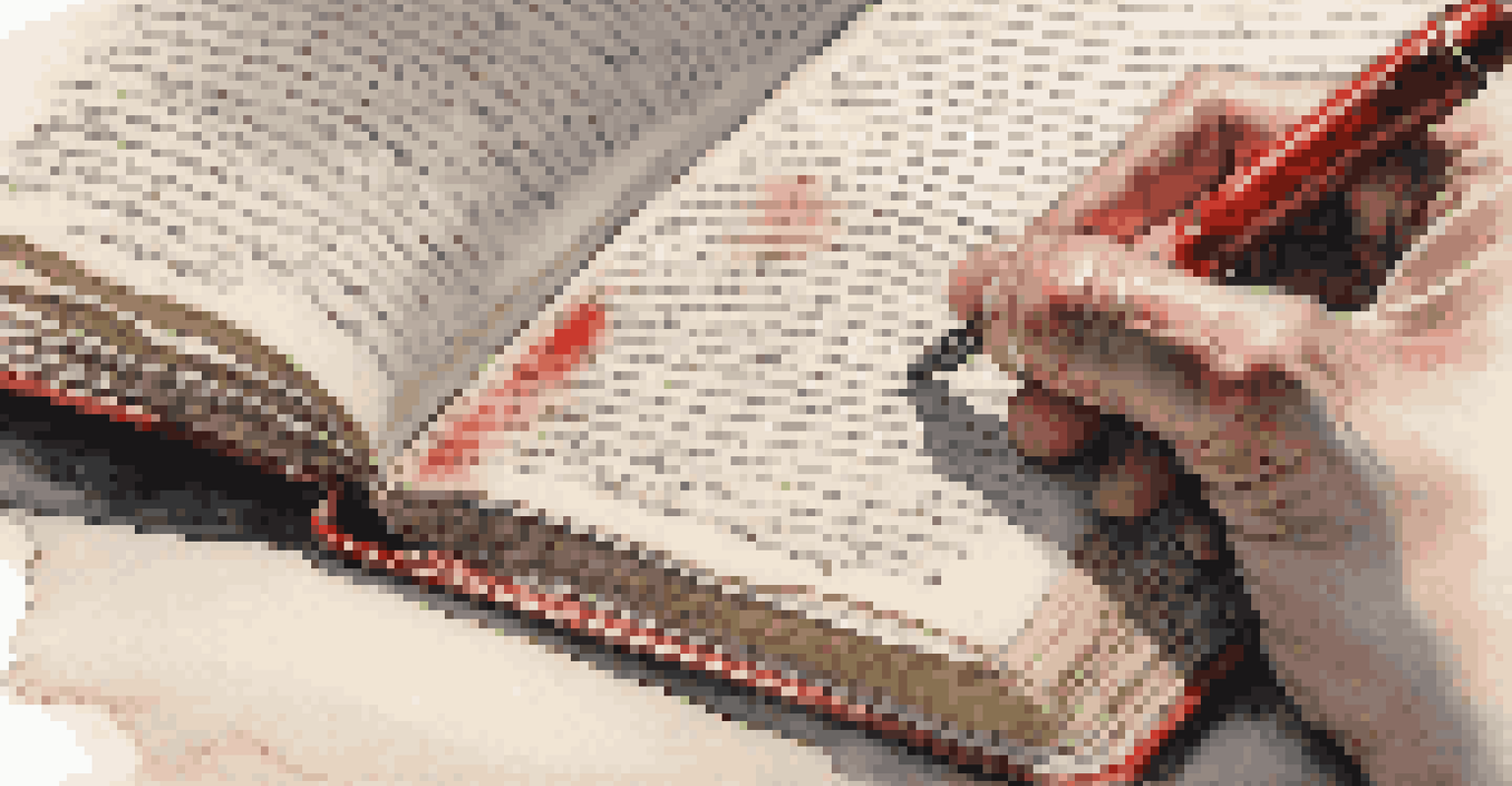The Power of Revision in Historical Writing

Understanding the Revision Process in Historical Writing
Revision is a crucial part of historical writing, allowing authors to refine their arguments and clarify their narratives. It’s not just about correcting typos or grammatical errors; it involves re-evaluating sources, interpretations, and the overall structure of the work. This process helps historians ensure that their work stands up to scrutiny and accurately represents the past.
History is not a fixed narrative but a conversation that evolves over time.
Through revision, writers can reassess the significance of their findings and make necessary adjustments based on new evidence or perspectives. For instance, a historian might discover an overlooked primary source that changes the interpretation of an event. Such moments highlight the dynamic nature of historical research, emphasizing that history is not a fixed narrative but a conversation that evolves over time.
Ultimately, the revision process is an opportunity for writers to engage more deeply with their subject matter, leading to richer and more nuanced historical accounts. It encourages a culture of critical thinking, where historians must question their assumptions and be open to altering their viewpoints based on fresh insights.
The Role of Feedback in Historical Revisions
Feedback is an invaluable component of the revision process, providing historians with diverse perspectives on their work. When peers, mentors, or editors review a manuscript, they often highlight areas that may require further clarification or evidence. This external input can spark new ideas and help writers identify any biases or gaps in their arguments.

Consider the case of a historian presenting a paper at a conference. The questions and critiques from the audience can lead to significant changes in the final published version. This interaction not only strengthens the historian’s arguments but also fosters a collaborative environment where knowledge is shared and improved upon.
Revision Enhances Historical Accuracy
The revision process allows historians to refine their arguments and integrate new evidence, ensuring their narratives accurately reflect the complexities of the past.
Moreover, embracing feedback encourages a growth mindset, allowing historians to view criticism as an opportunity for development rather than a setback. By actively seeking and incorporating feedback, writers can enhance their credibility and produce more compelling narratives that resonate with readers.
Revising for Clarity and Engagement in Historical Narratives
An effective historical narrative balances accuracy with readability. During revision, writers must consider their audience and strive for clarity without sacrificing the complexity of their subject matter. This often means simplifying complex ideas and using engaging language that draws readers in, making history accessible to a broader audience.
Revision is an opportunity for writers to engage more deeply with their subject matter.
For example, a historian writing about a convoluted political event might choose to break down the timeline into digestible parts, using anecdotes or metaphors to illustrate key points. This approach not only makes the narrative more engaging but also helps readers grasp the significance of the events being discussed.
Ultimately, revising for clarity ensures that the historical narrative is not just informative but also enjoyable to read. By focusing on the reader's experience, historians can create works that resonate and leave a lasting impact.
Incorporating New Research Through Revision
The field of history is constantly evolving, with new research emerging regularly. Revision allows historians to incorporate these findings into their work, ensuring that their narratives reflect the most current understanding of the past. This might involve integrating recent archaeological discoveries or re-evaluating previously accepted interpretations based on new evidence.
For instance, a historian revising a book about a historical figure may include insights from newly discovered letters that change the perception of that individual’s actions or motivations. Such updates not only enrich the narrative but also demonstrate the writer's commitment to accuracy and scholarship.
Feedback Fuels Historical Growth
Constructive feedback from peers and mentors during revision sparks new ideas and helps historians identify biases, ultimately leading to stronger narratives.
Incorporating new research through revision helps historians maintain relevance in their field and engage with contemporary discussions about historical interpretation. It underscores the idea that history is a living discipline, shaped by ongoing inquiry and discovery.
Revising Historical Context for Greater Understanding
Understanding the context in which historical events occur is essential for accurate interpretation. During revision, historians may refine the context of their narratives to provide readers with a clearer backdrop against which events unfold. This can involve exploring social, political, and economic factors that influenced the time period being studied.
For example, a historian revising a narrative about a war might delve deeper into the social movements that preceded the conflict, offering readers insight into the motivations behind the actions of historical figures. This added depth helps to humanize the past and allows readers to connect more profoundly with the material.
By revising historical context, writers can foster greater understanding and empathy among their audience. It reminds us that history is not just a series of events, but a tapestry woven from the lives and experiences of real people.
The Ethical Dimensions of Revision in Historical Writing
Revision in historical writing isn't just about improving clarity or incorporating new evidence; it also involves grappling with ethical considerations. Historians must be mindful of how their interpretations may impact different communities and narratives. This awareness is crucial in ensuring that marginalized voices are represented and that history is not skewed by dominant perspectives.
For instance, when revising a narrative that covers colonial history, a historian might reflect on the implications of their language and framing. They may choose to revise sections to better highlight the experiences of colonized peoples, ensuring that their stories are not overshadowed by the perspectives of colonizers.
Ethics Shape Historical Narratives
Historians must consider the ethical implications of their revisions to ensure marginalized voices are represented and that their work fosters inclusivity.
Engaging with the ethical dimensions of revision fosters a sense of responsibility in historians. It encourages them to approach their work thoughtfully, promoting inclusivity and respect for the diverse narratives that shape our understanding of the past.
The Impact of Revision on Historical Scholarship
Revision plays a pivotal role in the advancement of historical scholarship. As historians refine their arguments and incorporate feedback, they contribute to a collective body of knowledge that evolves over time. This iterative process not only enhances individual works but also shapes the discourse within the field.
Consider a landmark publication that undergoes multiple revisions before its final release. Each version reflects the author's growth and the changing landscape of historical inquiry, ultimately leading to a more robust contribution to scholarship. Such works often inspire further research and debate, highlighting the interconnectedness of historical writing.

By recognizing the impact of revision on scholarship, historians can appreciate their role in a larger academic conversation. Their commitment to continuous improvement helps ensure that historical narratives are not static but dynamic, reflecting the complexities of the past.